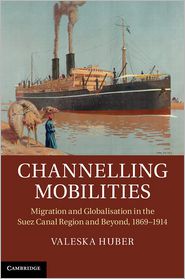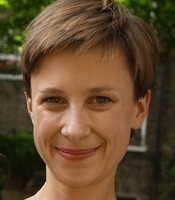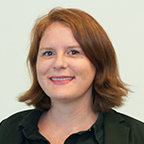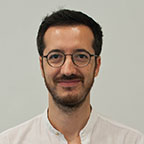- 20 Oct 2016
MEI Arabia-Asia Cluster Seminar: Book Discussion “Channelling Mobilities: Migration and Globalisation in the Suez Canal Region and Beyond, 1869-1914”
A monthly seminar organised by MEI’s Arabia-Asia Research Cluster.
Synopsis:
 The history of globalisation is usually told as a history of shortening distances and acceleration of the flows of people, goods and ideas. Channelling Mobilities refines this picture by looking at a wide variety of mobile people passing through the region of the Suez Canal, a global shortcut opened in 1869. As an empirical contribution to global history, the book asks how the passage between Europe and Asia and Africa was perceived, staged and controlled from the opening of the Canal to the First World War, arguing that this period was neither an era of unhampered acceleration, nor one of hardening borders and increasing controls. Instead, it was characterised by the channelling of mobilities through the differentiation, regulation and bureaucratisation of movement. Telling the stories of tourists, troops, workers, pilgrims, stowaways, caravans, dhow skippers and others, the book reveals the complicated entanglements of empires, internationalist initiatives and private companies.
The history of globalisation is usually told as a history of shortening distances and acceleration of the flows of people, goods and ideas. Channelling Mobilities refines this picture by looking at a wide variety of mobile people passing through the region of the Suez Canal, a global shortcut opened in 1869. As an empirical contribution to global history, the book asks how the passage between Europe and Asia and Africa was perceived, staged and controlled from the opening of the Canal to the First World War, arguing that this period was neither an era of unhampered acceleration, nor one of hardening borders and increasing controls. Instead, it was characterised by the channelling of mobilities through the differentiation, regulation and bureaucratisation of movement. Telling the stories of tourists, troops, workers, pilgrims, stowaways, caravans, dhow skippers and others, the book reveals the complicated entanglements of empires, internationalist initiatives and private companies.
About the Author:
 Valeska Huber holds degrees from the LSE, University of Cambridge and the University of Konstanz (PhD 2009), where she worked as a lecturer before joining the German Historical Institute of London in 2011. She has undertaken archival research in Britain, France, Egypt and Lebanon and spent a year as a Visiting Fellow at Harvard University working on her monograph on the history of global mobility and mobility control in the Suez Canal Region which appeared with Cambridge University Press in 2013. Her main fields of interest are colonial and global history with a focus on the Middle East, the history of mobility and migration, mass education and development.
Valeska Huber holds degrees from the LSE, University of Cambridge and the University of Konstanz (PhD 2009), where she worked as a lecturer before joining the German Historical Institute of London in 2011. She has undertaken archival research in Britain, France, Egypt and Lebanon and spent a year as a Visiting Fellow at Harvard University working on her monograph on the history of global mobility and mobility control in the Suez Canal Region which appeared with Cambridge University Press in 2013. Her main fields of interest are colonial and global history with a focus on the Middle East, the history of mobility and migration, mass education and development.
About the Discussants:
 Nele Lenze’s research focuses on the cultural online sphere in the Gulf. Her main research interests include literature published in social media, cultural production online and online participation culture. She holds a PhD in Middle Eastern Studies and Media Studies from the University of Oslo where she lectured on the Arab online sphere. She obtained her master’s in Arabic literature from Freie University Berlin. Recently she co-edited Converging Regions: Global Perspectives on Asia and the Middle East (2014) with Charlotte Schriwer as well as The Arab Uprisings: Catalysts, Dynamics, and Trajectories with Fahed Al-Sumait and Michael Hudson (2014).
Nele Lenze’s research focuses on the cultural online sphere in the Gulf. Her main research interests include literature published in social media, cultural production online and online participation culture. She holds a PhD in Middle Eastern Studies and Media Studies from the University of Oslo where she lectured on the Arab online sphere. She obtained her master’s in Arabic literature from Freie University Berlin. Recently she co-edited Converging Regions: Global Perspectives on Asia and the Middle East (2014) with Charlotte Schriwer as well as The Arab Uprisings: Catalysts, Dynamics, and Trajectories with Fahed Al-Sumait and Michael Hudson (2014).
 Serkan Yolacan is a Ph.D. candidate in the Department of Cultural Anthropology at Duke University. His research focuses on the role of diasporas in the transformation of state and society. His dissertation project, entitled The Azerbaijani Triangle: Order Beyond Borders Across West Asia, employs diasporic analytics to explore transnational networks of religion, education, and business across Iran, Azerbaijan, Russia, and Turkey. He is a graduate of Sabanci University, Central European University, and Duke University and has previously worked as Projects Officer at the Turkish Economic and Social Studies Foundation in Istanbul.
Serkan Yolacan is a Ph.D. candidate in the Department of Cultural Anthropology at Duke University. His research focuses on the role of diasporas in the transformation of state and society. His dissertation project, entitled The Azerbaijani Triangle: Order Beyond Borders Across West Asia, employs diasporic analytics to explore transnational networks of religion, education, and business across Iran, Azerbaijan, Russia, and Turkey. He is a graduate of Sabanci University, Central European University, and Duke University and has previously worked as Projects Officer at the Turkish Economic and Social Studies Foundation in Istanbul.
Please email meievent@nus.edu.sg for further details.




